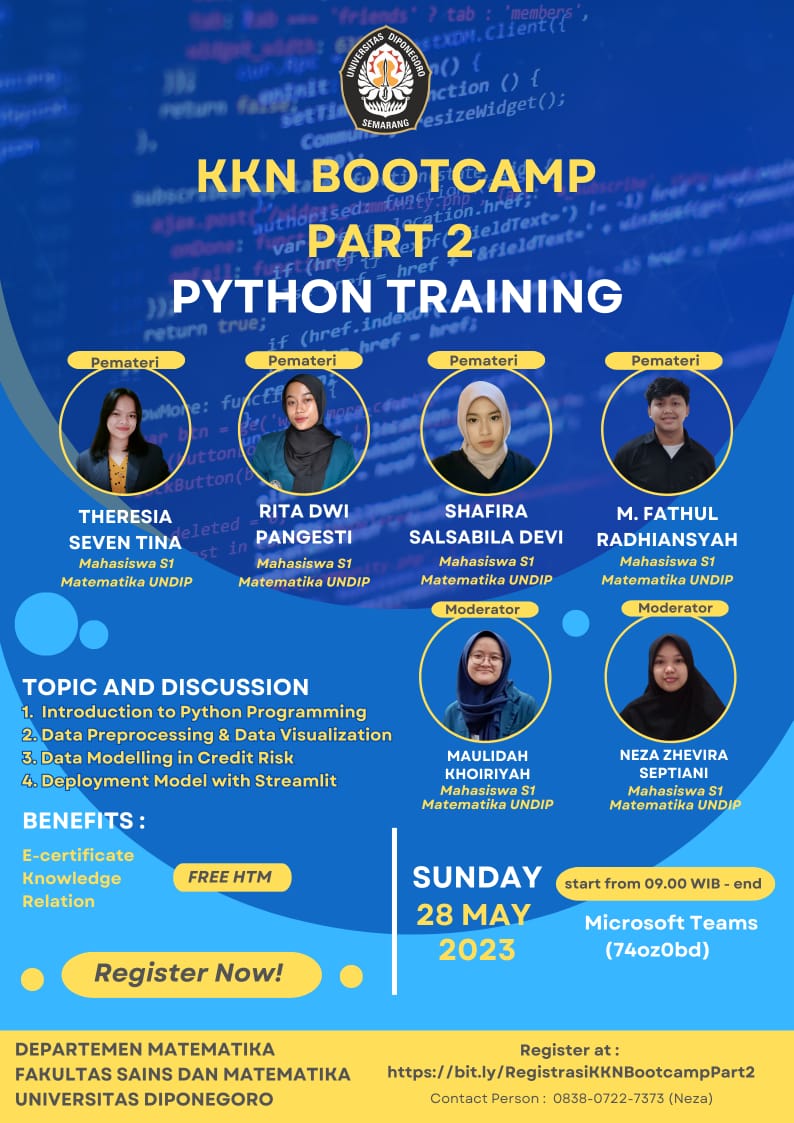Diponegoro University Mathematics Students held a series of events in the form of Python training online on Sunday, 28th May 2023, with the theme “Developing Credit Risk Scoring Expertise in the Digital Era.” This training was carried out as one of the implementations of community service, namely as one of the requirements for converting Kuliah Kerja Nyata (KKN) in the Study Independent program for Kampus Merdeka in the Mathematic Bachelor study program at Diponegoro University. The Python training was enthusiastically welcomed by the students because more than 30 students attended this training.
Study Independent is a part of the Kampus Merdeka program that was organized by the Ministry of Education, Culture, Research, and Technology. The purpose of holding this Study Independent is to provide opportunities for students to study off-campus by participating in learning held directly by partners/companies in collaboration with the Ministry of Education, Culture, Research, and Technology. This program covers several fields, such as technology, health, BUMN, services, and other fields. In this program, there are many corporate partners such as Yayasan Bakti Achmad Zaky (Startup Campus), PT Zona Edukasi Nusantara (Zenius), and PT Revolusi Citra Edukasi (RevoU) which focuses on technology.
Study Independent at Yayasan Bakti Achmad Zaky with a track in artificial intelligence focusing on computer vision, has demand and prospect for digital talent. The material taught about artificial intelligence covers AI Foundation, Python Foundation, Data Science, Machine Learning, Deep Learning, Computer Vision, and Git Collaboration. Learning activities carried out online include individual learning, live session, quizzes, individual and team projects, mentoring, product development, and pitching products on demo day. Learning session is carried out asynchronously and synchronously. Asynchronous learning is carried out through learning videos and other learning references. Meanwhile, synchronous learning is implemented through live sessions facilitated by expert speakers.
Furthermore, PT Revolusi Citra Edukasi focuses to provide participants with an overview of careers that can be pursued in technology companies, especially in 4 significant fields namely Digital Marketing, Software Engineering, Product Management, and Data Analytics. These four positions are key positions for technology companies, where all of them are always present in every company. Learning activities are studied online which include self-study, peer-to-peer discussion, mentoring, lectures, individual assignments, and capstone projects. In the process capstone project, participants are given a variety of tools that help with the work. On vertical software engineering and data analytics, participants are taught how to use Python to solve capstone projects. The reason for using it is that the syntax in Python is simpler than other programming languages.
Meanwhile, PT Zona Edukasi Nusantara focuses on the field of Data Analyst and teaches about Data Preprocessing, Python programming focuses on Machine Learning, Feature Engineering, Data Visualization using Google Data Studio, and methods of Credit Risk Scoring in banking and financial mathematics. At the end of the session, there is a class Career Coaching to prepare participants for the world of work.
As a form of implementation after completing the Study Independent program, students studied community service activities by holding training on the use of Python in credit risk scoring. Python is a programming language widely used in web applications, software development, and data science machine learning. The reason developers use Python is because it is efficient and easy to learn and can run on multiple platforms. Python software is free to download, integrates well with all types of systems, and increases development speed. In the world of finance, credit risk evaluation is an important element used by financial institutions to assess a client’s ability to repay a loan. Method credit risk scoring is one of the approaches used to measure credit risk by analyzing historical data and related factors. In this KKN program, we studied Python training with the method of Credit Risk Scoring as part of our efforts to introduce and build credit risk analysis skills in the surrounding community.
The material presented was divided into four sessions. The first session was delivered by Theresia Seven Tina, a Study Independent participant at PT Revolusi Citra Edukasi, which discussed the introduction of Python and Credit Risk Scoring. Then, the second session was continued by Rita Dwi Pangesti, who is a Study Independent participant at the Yayasan Bakti Achmad Zaky (Startup Campus) tracking artificial intelligence and discussing data pre-processing and data visualization. The third session was delivered by Shafira Salsabila Devi, a Study Independent participant at PT Zona Edukasi Nusantara which tracks data analyst and talks about data modeling on credit risk scoring. Then the last session was filled by Muhammad Fathul Radiansyah, who is a Study Independent participant at the Yayasan Bakti Achmad Zaky (Startup Campus) tracking artificial intelligence and discussing deployment models with Streamlit.
This training is designed to introduce participants to basic credit risk scoring and how Python can be used as a tool to perform an effective credit risk analysis. We introduce them to library popular like pandas, numpy, and sci-kit-learn which facilitates data pre-processing and predictive model building. We also describe various modeling techniques such as logistic regression, naive bayes classifier, and decision tree. Python training methods about credit risk scoring provide significant benefits to participants. They can gain a deeper understanding of credit risk evaluation and how predictive models can be used to make better decisions.
During this KKN program, we saw that participants were able to develop strong Python programming and data analysis skills. We hope that the comprehension and skills they gain from this training will give real benefit to them in the future. Python training methods about credit risk scoring in this KKN program should be a small step that we take to introduce technology and data analysis skills to the public. We hope that this program can be a foundation for further development in the field of finance and risk analysis in the community.

